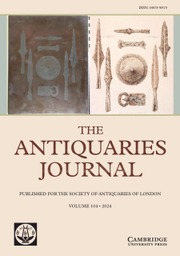Article contents
Private Purse Accounts of the Marquis of Hertford, Michaelmas 1641–2
Published online by Cambridge University Press: 08 January 2012
Extract
A few months ago the catalogue of an auction sale in Shropshire contained an entry of a manuscript, believed to be of the fifteenth century, relating to Herefordshire. Upon inspection it was established that this was an imperfect rent roll, probably of the steward of a bishop of the see of Hereford. Unfortunately as the caption and several membranes are missing it is impossible to give the exact date.
Near by in the sale room was a box of oddments, largely consisting of old school books and miscellaneous articles. Upon turning these over the writer noticed a folio manuscript volume, bound in leather, and found that this was the steward's records of leases of various properties belonging to the Somerset family in Herefordshire in the seventeenth century. A commission to purchase the two manuscripts for Hereford Public Library was unsuccessful, but later they were secured by negotiation. Upon closer examination the volume was found to have served two purposes. It had been turned upside down and the one end used to record the private purse expenses of the marquis of Hertford for a year from Michaelmas 1641 to Michaelmas 1642 by William Booth, his steward. It had been intended to record six months' expenditure only, but this had been extended to the full year, as noted in a different handwriting.
- Type
- Research Article
- Information
- Copyright
- Copyright © The Society of Antiquaries of London 1945
References
page 13 note 1 This is my friend, Abel, an honest fellow;
He lets me have good tobacco, and he does not
Sophisticate it with sack-lees or oil,
Nor washes it in muscadel and grains,
Nor buries it in gravel, under ground,
Wrapp'd up in greasy leather, or piss'd clouts:
But keeps it in fine lilly pots, that, open'd,
Smell like conserve of roses, or French beans.
He has his maple block, his silver tongs,
Winchester pipes, and fire of juniper,
A neat, spruce, honest fellow, and no goldsmith.
From The Alchemist, by Ben Jonson. Act I, Scene 3, line 31.
1. Sir Theodore Turquet de Mayerne, 1573–1655. Royal district physician at Paris 1600; treatise on chemical remedies condemned by College of Physicians at Paris 1603. Came to England 1606 and after 1611 resided entirely in England and attended the Royal family and nobility. Knighted 1624. Among many other activities he wrote a valuable account of typhoid, of which disease Prince Henry died in 1611.
2. Francis Cottington, Baron Cottington, 1578–1652. English agent at Madrid 1609–11, Secretary to Charles, Prince of Wales, 1622, dismissed from Court 1623, Chancellor of Exchequer 1629–42, built Hanworth house, etc.
3. John, the fifth son of the marquis, afterwards fourth duke of Somerset, who died without issue on 29th April 1675.
4. Henry, the third son (1626–54), father of William, the third duke.
5. William Cavendish, Duke of Newcastle, 1592–1676, commander of the north, raised the siege of York 1642. Spent nearly £1,000,000 in the royal service.
6. Jane, the third daughter, married Charles, Viscount Dungarvan; d. 23rd November 1679.
7. Frances, eldest daughter, married (1) Richard, second Viscount Molyneux; (2) Thomas Wriothesley, fourth earl of Southampton; (3) Conyers D'Arcy, second earl of Holderness; bur. January 1680.
8 Mary, second daughter, married Heneage Finch, second earl of Winchilsea; d. before 1673.
9. Ratteen. The earliest recorded use of this word in the O.E.D. is 1685.
10. Robert, the second son, 1622 to Jan. 1645–6, became Lord Beauchamp upon the death of William, the eldest son, 1642. On p. 19 Lord Beauchamp and Lord Robert appear in succeeding paragraphs. On p. 21 there is a record of a sword bought for Robert, Lord Beauchamp, for which £1. 16s. was paid. This shows that his brother had passed away by the time this entry was written, though there is nothing to show this in the accounts except perhaps the large amount spent on articles of clothing entered on p. 16 which have a funereal appearance.
11. Lucius Cary, second Viscount Falkland, 1610?–1643. Secretary of State, 1642. Went with Charles I to York.
12. Probably Josias Shute (1588–1643). Chaplain to the East India Company, Archdeacon of Colchester, 1642.
13. The earl of Essex was brother to the marchioness of Hertford.
14. The total is omitted.
- 1
- Cited by




